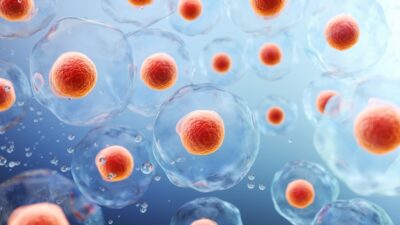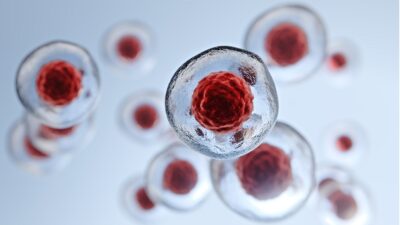Alpha-Ketoglutarate Delays Age‐Related Fertility Decline
- AKG appears to slow down aging and fertility decline in mice.

Alpha-ketoglutarate (AKG) is a popular dietary and sports supplement frequently used in the bodybuilding world, but interest in this molecule has more recently reached the aging research field for its potential to slow down aging.
AKG is a naturally occurring endogenous intermediary metabolite, which means that our own bodies create it, and is part of the Krebs cycle. The supplement industry manufactures AKG, and such molecules are chemically identical to natural ones.
In a new study, researchers investigated the link between AKG and aging of the reproductive system in mammals, including mice, pigs, and humans. Previous studies have also suggested that AKG declines in certain human tissues during aging. While ascertain ing the mechanisms at play in this decline, they demonstrated that AKG has an influence on the age-related decline of fertility of mice.
Delayed fertility decline and telomere attrition
The mice treated with AKG retained ovarian function, with egg quality and quantity above that of untreated control mice of the same age.
The long-term supplementation of AKG also appeared to slow down the mice’s rate of telomere attrition, which is one reason that mice and humans are thought to age. The researchers compared the telomere length in the ovaries of 14-month-old mice with those of 8-week-old mice. As expected, the old mice in the control group had significantly shorter telomeres than the young mice. However, the mice that had been given regular AKG had significantly longer telomeres than the control mice of the same age.
The AKG treated mice also showed slightly, but not significantly, telomerase activity compared to the untreated control mice. The data showed that the expression of Sirt6, Tert, and Terc, genes that play a role in telomere maintenance, were all down-regulated in the ovaries of the control mice; in the AKG-treated mice, this down-regulation was significantly reversed.
Increased SOD and reduced mTOR signaling
The activity of the superoxide dismutase (SOD) enzyme was also observed to be slightly elevated in the ovaries of the AKG-treated mice. SOD is an enzyme that helps to break down potentially harmful oxygen molecules within cells and could reduce or prevent damage to tissues.
AKG treatment also appeared to inhibit mTOR signaling, whose elevated levels are thought to be another reason we age. Reduced mTOR activity lengthens lifespan in model organisms, such as mice, yeast, worms, and flies. Previous studies also show that mTOR activity increases in the hypothalami of aged mice, which promotes late-life obesity.
Mitochondria is a primary target of AKG
The mitochondria also appear to be a primary target of AKG, and treatment affected 17 mitochondrial genes, increasing the activity or some genes and reducing others. One way in which AKG appears to influence mitochondria is by inhibiting ATP synthase, a ubiquitous enzyme involved in the energy metabolism of most living cells.
AKG suppresses ATP synthase, which leads to a reduction of available ATP, decreased oxygen consumption, and an increase of autophagy in the cells. This means that mitochondrial function is being somewhat suppressed by AKG, particularly the electron transport chain. This partial suppression is also associated with increased lifespan as seen in previous studies with C.elegans, and the hope is that these results may translate to humans.
It’s rather like the popular saying “Life fast, die young”: AKG allows cells to “Live slow, die old”. This slowing down of metabolism is likely a reason why AKG appears to delay aging.
The fecundity reduction with aging is referred as the reproductive aging which comes earlier than that of chronological aging. Since humans have postponed their childbearing age, to prolong the reproductive age becomes urgent agenda for reproductive biologists. In the current study, we examined the potential associations of α‐ketoglutarate (α‐KG) and reproductive aging in mammals including mice, swine, and humans. There is a clear tendency of reduced α‐KG level with aging in the follicle fluids of human. To explore the mechanisms, mice were selected as the convenient animal model. It is observed that a long term of α‐KG administration preserves the ovarian function, the quality and quantity of oocytes as well as the telomere maintaining system in mice. α‐KG suppresses ATP synthase and alterations of the energy metabolism trigger the nutritional sensors to down‐regulate mTOR pathway. These events not only benefit the general aging process but also maintain ovarian function and delay the reproductive decline. Considering the safety of the α‐KG as a naturally occurring molecule in energy metabolism, its utility in reproduction of large mammals including humans deserves further investigation.
Conclusion
This study, which builds on previous work with C.elegans, supports the idea that AKG could slow down aging and support healthspan in humans if its results translate from mice to humans.
AKG has been in the spotlight in recent months with researchers such as Dr. Brian Kennedy, who gave a talk that included AKG at Ending Age-Related Diseases 2020. Brian is working hard to launch studies including AKG in humans to see if results like this study translate.








